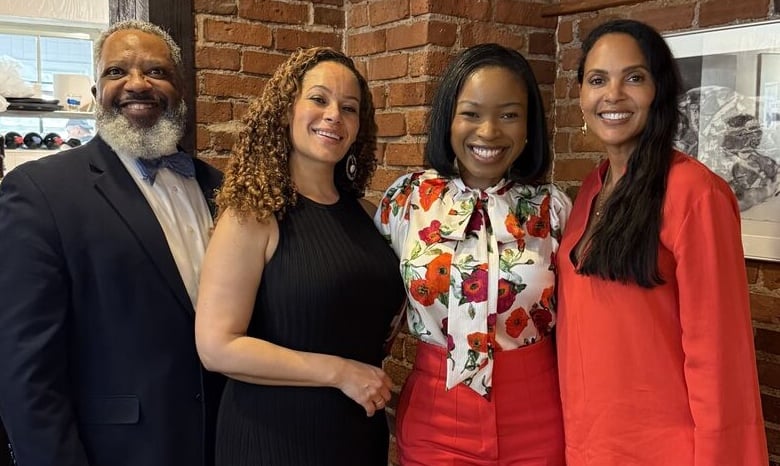Dr. Jerome Offord, Jr, CDO, Harvard Library, Risë Nelson, Director, DEIA, Yale Library & Collections,Yale Library, Dr. Ufuoma Abiola, Executive Head and Associate University Librarian for DEI, Princeton University Library, and DeEtta Jones
Whenever I'm asked about the career accomplishment of which I am most proud, I say the same thing without hesitation: the Leadership and Career Development Program (LCDP).
I began my role with the Association of Research Libraries (ARL) in 1996. As Program Officer for Diversity, I was charged with supporting ARL’s then 125 member institutions—some of the largest academic and research libraries in North America—in shaping and implementing strategies to build more inclusive workplaces.
It took no time at all, after listening to colleagues across the field, to understand a critical need: an infusion of people of color in leadership roles. Too many talented BIPOC professionals were getting stuck in individual contributor roles. Others felt compelled to leave ARL institutions altogether in order to advance, often moving to smaller academic libraries or public institutions where paths to leadership were more accessible.
The challenge wasn’t about talent or ambition. It was structural. And cultural.
In many academic libraries, leadership was represented as a path that required personal detachment—an expectation that you had to choose between professional growth and staying true to core personal values. For some, including Indigenous professionals deeply rooted in their communities, that sacrifice felt especially painful or simply impossible.
So, I asked myself: How do we expand the definition of leadership? How do we make visible the pathways for people who don’t see themselves reflected in the top ranks—but whose values, perspectives, and talents are exactly what our profession needs?
That question became the heartbeat of what would eventually become the Leadership and Career Development Program.
With the guidance and meaningful support of colleagues across ARL and its member libraries, I wrote a grant proposal. The vision was bold but clear: create a program that would nurture early- and mid-career librarians of color, offering them the mentorship, skills, and network needed to step confidently into leadership.
The proposal was funded. The program launched. And what has followed over the past 26 years has been nothing short of extraordinary.
A Legacy of Community, Courage, and Contribution
Last week, I had the privilege of joining the 2025 class of LCDP Fellows at Yale University for one of their program institutes. Sitting with them—hearing their stories, witnessing their brilliance, and seeing the strength of the community they’ve already built, it took my breath away.
This is the impact of intentional leadership development.
LCDP has become a vital space for early and mid-career professionals to hone their skills, deepen their sense of purpose, and develop a network that supports and champions them throughout their careers. And it’s not just about individual growth.
This program has also created a ripple effect—a leadership pipeline that is transforming the profession. LCDP alumni have gone on to become presidents of the American Library Association (ALA), the Association of College and Research Libraries (ACRL), and ARL itself. They are deans, directors, scholars, innovators, and changemakers across the country. They are shaping not only the libraries they lead but the broader higher education landscape.
But beyond titles, what inspires me most is the sense of community, vision, and shared responsibility that LCDP fosters. This program was never about “fixing” underrepresented professionals to fit dominant models of leadership. It has always been about reimagining leadership—centering authenticity, cultural competence, and collective impact.
Leadership That Looks Like Us
One of the early lessons I learned in designing and sustaining the LCDP is that leadership development for equity must be rooted in belonging. It’s not enough to say, “You can lead too.” We have to build environments where people can lead as themselves—bringing their identities, languages, cultures, and commitments to justice into their work unapologetically.
That’s what LCDP has done. It has opened doors. It has created a space for healing, affirmation, and strategic growth. It has helped people who might have once questioned whether they belonged at the leadership table realize: I not only belong—I bring something essential.
And it has invited library directors and senior leaders into that process—offering them the chance to see and support emerging talent in new ways. Many have become mentors, champions, and co-conspirators in the work of equity and inclusion. Together, we’ve created a shared vision that continues to evolve with the times while holding true to its core purpose.
A Model, A Movement
The LCDP wasn’t a one-off. It became a model, and other initiatives soon followed—each informed by the same foundational insight: systemic change requires both vision and infrastructure. You need bold ideas, yes—but you also need systems, support, and sustained commitment.
As I look back, I am filled with pride—not just in the program, but in the people who have carried its mission forward. I am proud of what we can do when we come together as a community of purpose—when we believe in a future that is more just, more inclusive, and more human.
Because that’s the point of leadership, isn’t it?
Not just to climb ladders or accumulate titles, but to create outsized impact—to build something that lives beyond us, that serves many, and that lights the way for those still coming up.
That’s what LCDP has done, and continues to do.
And that, for me, will always be the proudest accomplishment of my career.
- DeEtta

